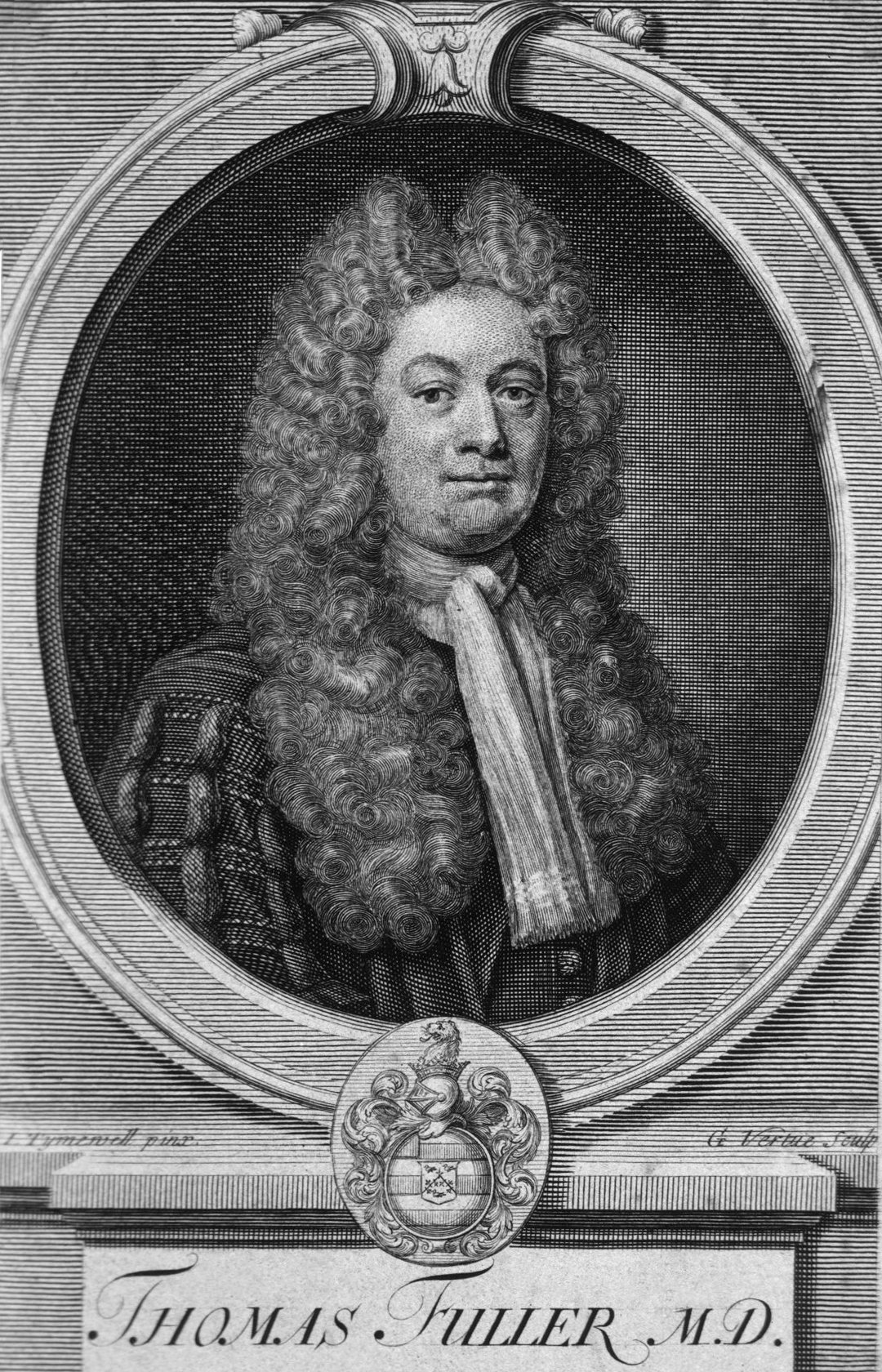“5225. To seek a Needle in a Bottle of Hay.”
Introductio ad prudentiam: Part II (1727), Gnomologia (1732)
Thomas Fuller, M.D. was a British physician, preacher and intellectual.
Fuller was born in Rosehill, Sussex, and educated at Queens' College, Cambridge. He practised medicine at Sevenoaks.
In 1723 he published Pharmacopoeia Domestica, and in 1730 Exanthematologia, Or, An Attempt to Give a Rational Account of Eruptive Fevers, Especially of the Measles and Small Pox. In 1732 he published a compilation of proverbs titled Gnomologia: Adagies and Proverbs; wise sentences and witty saying, ancient and modern, foreign and British which includes the words, "Be you never so high, the law is above you".
Wikipedia

“5225. To seek a Needle in a Bottle of Hay.”
Introductio ad prudentiam: Part II (1727), Gnomologia (1732)
“620. An idle Person is the Devil's Playfellow.”
Introductio ad prudentiam: Part II (1727), Gnomologia (1732)
Variante: 3054. Idle Fellows are the Devil's Playfellows.
“5499. What is the Use of Patience, if we cannot find it when we want it?”
Compare Poor Richard's Almanack (1747) : What signifies your Patience, if you can't find it when you want it.
Introductio ad prudentiam: Part II (1727), Gnomologia (1732)
“3314. Make Hay, while the Sun shines.”
Introductio ad prudentiam: Part II (1727), Gnomologia (1732)
“5335. Two things a Man should never be angry at; what he can help, and what he cannot help.”
Introductio ad prudentiam: Part II (1727), Gnomologia (1732)
“92. A Father is a Treasure, a Brother a Comfort; but a Friend is both.”
Compare Poor Richard's Almanack (1747) : A Father's a Treasure; a Brother's a Comfort; a Friend is both.
Introductio ad prudentiam: Part II (1727), Gnomologia (1732)
“5572. When the Cat's gone, the Mice grow sawcy.”
Introductio ad prudentiam: Part II (1727), Gnomologia (1732)
Variante: 6131. When the Cat is away,
The Mice may play.
“3769. One may as much miss the Mark, by aiming too high, as too low.”
Introductio ad prudentiam: Part II (1727), Gnomologia (1732)
Excerpt from Introductio ad prudentiam: Part II, To the Reader (Prefatory Remarks).
Introductio ad prudentiam: Part II (1727)
“3881. Plants too often removed will not thrive.”
Compare Poor Richard's Almanack (1737) : I never saw an oft-transplanted tree, nor yet an oft-removed family, that throve so well as those that settled be.
Introductio ad prudentiam: Part II (1727), Gnomologia (1732)
“3685. Not to oversee Workmen, is to leave them your Purse open.”
Compare Poor Richard's Almanack (1751) : Not to oversee Workmen, is to leave them your Purse open.
Introductio ad prudentiam: Part II (1727), Gnomologia (1732)
“2445. He's a Slave, that cannot command himself.”
Introductio ad prudentiam: Part II (1727), Gnomologia (1732)
“4163. Silent Men, like still Waters, are deep and dangerous.”
Introductio ad prudentiam: Part II (1727), Gnomologia (1732)
“4706. The Pitcher, that goes often to the Well, comes home broken at last.”
Introductio ad prudentiam: Part II (1727), Gnomologia (1732)
“3736. One barking Dog, sets all the Street a barking.”
Introductio ad prudentiam: Part II (1727), Gnomologia (1732)
“1887. Think thyself happy if thou hast one true Friend; never think of finding another.”
Introductio ad prudentiam: Part II (1727)
“5733. Whosoever engages in many Pursuits, rarely suceeds in one.”
Introductio ad prudentiam: Part II (1727), Gnomologia (1732)
“4858. There are more old Drunkards, than old Physicians.”
Compare Poor Richard's Almanack (1736) : There's more old Drunkards than old Doctors.
Introductio ad prudentiam: Part II (1727), Gnomologia (1732)
“5414. Want of Care does us more Damage than want of Knowledge.”
Introductio ad prudentiam: Part II (1727), Gnomologia (1732)
“342. A Penny sav'd is Two-pence got.”
Compare Poor Richard's Almanack (1737) : A Penny sav'd is Twopence clear.
Introductio ad prudentiam: Part II (1727), Gnomologia (1732)
Introductio ad prudentiam: Part II (1727)
“1090. Cheat me in the Price, but not in the Goods.”
Introductio ad prudentiam: Part II (1727), Gnomologia (1732)
“5038. Three may keep Counsel, if two be away.”
Compare Poor Richard's Almanack (1735) : Three may keep a Secret, if two of them are dead.
Introductio ad prudentiam: Part II (1727), Gnomologia (1732)
“331. A Mouse in Time may shear a Cable asunder.”
Compare Poor Richard's Almanack (1735) : By diligence and patience, the mouse bit in two the cable.
Introductio ad prudentiam: Part II (1727), Gnomologia (1732)
“2788. If you sleep till Noon, you have no right to complain that the Days are short.”
Introductio ad prudentiam: Part II (1727), Gnomologia (1732)
“598. An empty Sack cannot stand upright.”
Compare Poor Richard's Almanack (1740) : An empty bag will not stand upright.
Introductio ad prudentiam: Part II (1727), Gnomologia (1732)
“4633. The longest Day must have an End.”
Introductio ad prudentiam: Part II (1727), Gnomologia (1732)